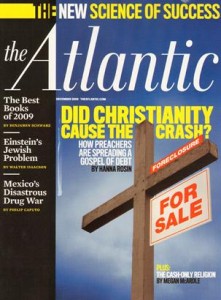3 articles worth reading
 High on the growing list of endangered media species is long-form magazine journalism. In a world of 140-character updates and 60-second video clips, do we have the attention span (and the business model) to sustain carefully-crafted 5,000-word articles?
High on the growing list of endangered media species is long-form magazine journalism. In a world of 140-character updates and 60-second video clips, do we have the attention span (and the business model) to sustain carefully-crafted 5,000-word articles?
I sure hope so. Because even in a tough environment, there’s some great work coming out of magazines. Here are three pieces I read in the past two weeks with ideas and stories hard to reduce to a Tweet — and that really come to life on the printed page. (Of course, this being the interwebs, I have to provide links.)
1. The Science of Success (The Atlantic) — David Dobbs reveals some remarkable findings from biological psychiatry showing that people with genes that predispose them to certain troublesome and self-destructive behavior can actually outperform those without such “bad genes.” They’re like orchids, Dobbs says. They’re fragile in many environments, but in the right greenhouse they can bloom spectacularly.
2. Vanish (Wired) — Writer Evan Ratliff tried to disappear for a month, shedding his identity entirely. Meanwhile, Wired offered $5000 to anybody who could find him. The result is a riveting cat-and-mouse tale — with some smart insights into identity in a transparent world. (Added bonus: The photography in this piece is gorgeous.)
3. Accept Defeat: The Neuroscience of Screwing Up (Wired) — Many experiments in science fail, says Jonah Lehrer. But that’s not a problem. The problem is that most of those failures are ignored — and it’s these often-dismissed anomalies that contain the seeds of real breakthroughs. One of the most thought-provoking articles I’ve read in a long while.
I really liked the idea in the Atlantic about Orchid children. It makes me recall all those people who have achieved greatness who were misfits in school. Because they were nurtured and taken care of, they were able to achieve greatness. It’s a shame that our education system, which over-stresses conformity is geared toward breeding dandelion children, those kids who may not cause trouble, but they certainly wont change the world. An excellent article.
Thanks for the recommendation on the other two.
As the father of an autistic son, I read David Dobb’s article with great interest. Though we never looked at it in terms of orchids and dandelions, our approach has been one of cultivating on and building our son’s strengths while trying to minimize the issues created by the “weaknesses” resulting from his autism.
The article didn’t address autism specifically, and some will argue that autism isn’t a genetically based disorder. I think, though, if they read the article and take what I believe to be its true meaning, they will gain a better understanding not only of their children but of their relationship with them.
Hi Dan,
Neat list, thanks! I especially like the last one, Accept Defeat.
I agree that the magazine is going the way of the dodo bird. I think the same is true for newspapers. It’s interesting how the internet has changed our view of the world. It seems silly to me to kill trees just to deliver the news.
I’m a grad student in statistics and one day I asked a professor if results which
do not reject ‘the null hypothesis’ are published or recorded somewhere.
I knew what the answer was, but I asked anyway. So what happens is someone comes up with an idea for an experiment to test, for example, if a chemical found in frog ear wax slows down the growth of tumor. Many hours are spent collecting the frog ear wax – the experiment is performed and the results are negative. This never gets published. So, it is possible someone somewhere will
go through the same steps all over again. What a waste of time. There needs to be a journal – maybe the Journal of Non Significant Results. the old story about Thomas Edison – he didn’t think he failed e Remember each time he tried something that did not work in his light bulb. He though of it as discovering something that did not work – and then tried something new.
Thanks for the great recommendations. I am a fan of the thoughtful long form story/article/post – regardless of method of delivery – video, paper, digital ….
Thanks for the links!
I also loved the first two articles, Orchid Kids and Vanished, but would’ve missed the third, so thanks for the highlight. Looking forward to Town Hall Seattle on Monday and hearing more about Drive. It’s a great book!